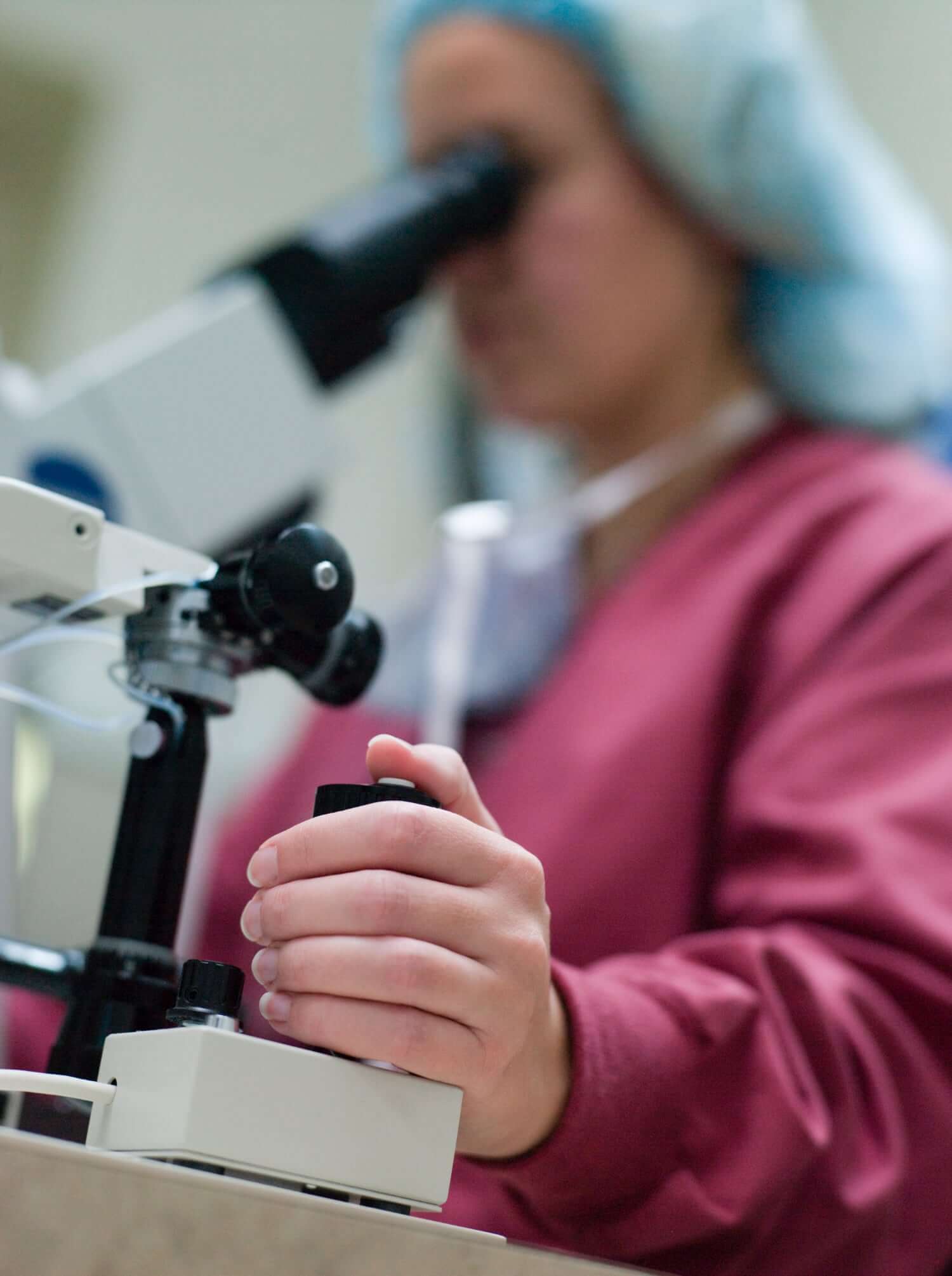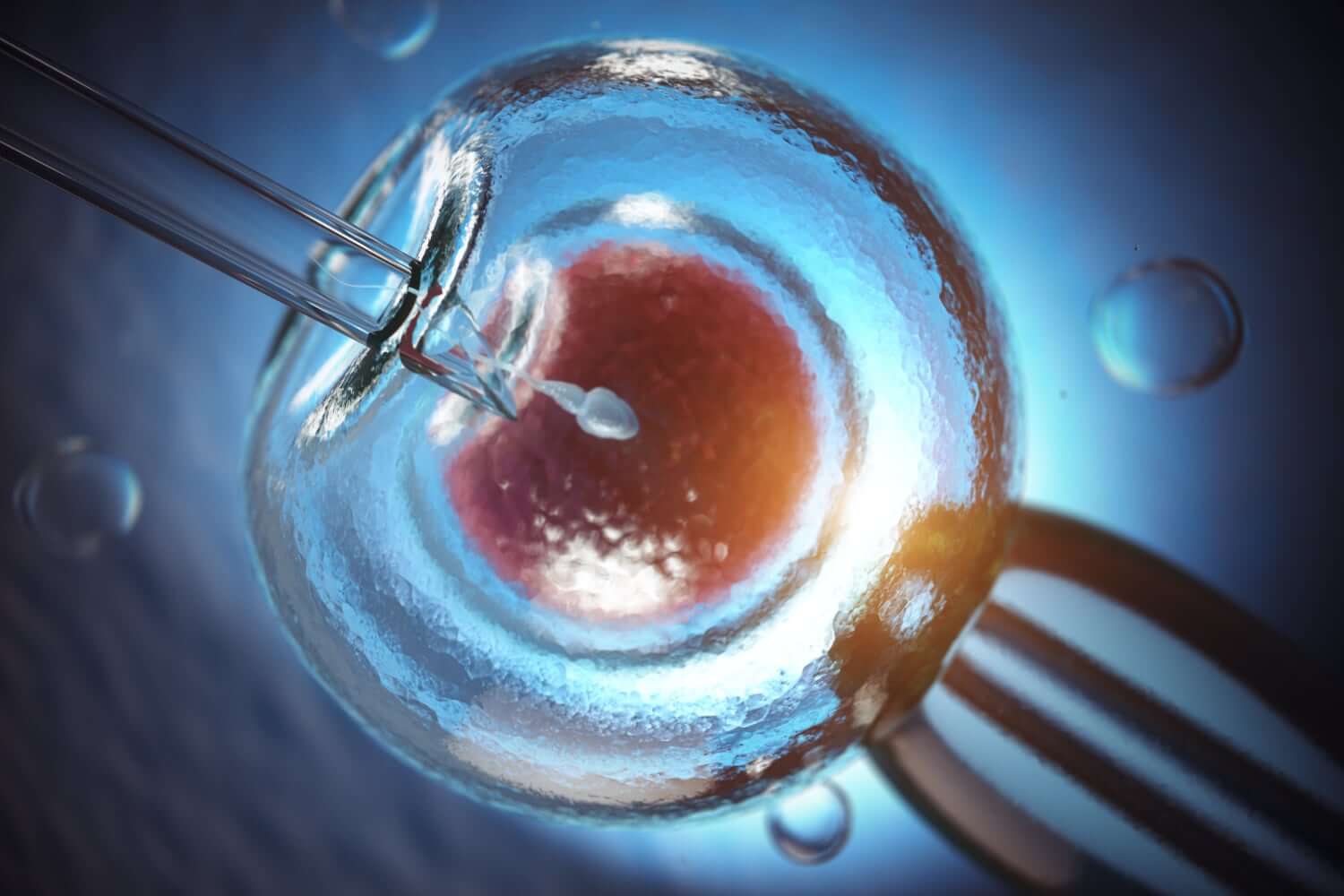IVF
What is IVF?
In a normal menstrual cycle your ovaries produce 1 egg every month. With IVF your fertility specialist will prescribe medications to stimulate the follicles in your ovaries so they produce multiple eggs. You will be closely monitored with blood tests and ultrasounds to see how the follicles are developing.
When the eggs are retrieved an embryologist will look at the eggs under the microscope. As not all eggs will have matured, they will pick the ones that are matre, and these eggs will be fertilised with sperm.

Step 1: Blood test
On day one of your menstrual cycle you will call your fertility clinic to let them know that your period has started. You will also have a blood test in the morning. When your menstrual cycle starts in the afternoon, the following day will be considered your day one.Step 2: Hormone stimulation
On the second or third day of your menstrual cycle, your hormone stimulation treatment will start. This means you will start taking medication that stimulates your follicles so they produce multiple eggs. You will do this until the eggs are a certain size. For some women this happens after 8 days, others will take longer.Step 3: Trigger shot
Once the eggs have reached a certain size, you will give yourself a trigger injection. The shot contains hCG hormone, or Human Chorionic Gonadotropin, which triggers your ovary to mature and release an egg.Step 4: Egg retrieval
About 34-36 hours after the trigger shot, your eggs will be retrieved either in a procedure room or operating theatre. It is a short procedure performed under sedation or anaesthetic. Your fertility specialist will use a thin needle within an ultrasound guide. The thin needle will go through your vagina wall into the follicles to retrieve the eggs. If the fertility specialist cannot access your follicles using a transvaginal ultrasound, you will be scheduled for egg retrieval via laparoscopic surgery.Step 5: Semen sample
In case you are using your partner’s fresh sperm, he will be asked to produce a semen sample on the same day of the egg collection. In some cases it is not possible to retrieve sperm from the ejaculate and a surgical procedure is performed to extract sperm directly from the testicles.
In some cases you may use frozen donor sperm, for example in case you are single or in a same sex relationship.
Step 6: Fertilisation
In case of conventional IVF, healthy sperm and eggs are brought together on a dish and incubated overnight. In some cases your fertility specialist might recommend ICSI or Intra Cytoplasmic Sperm Injection as the procedure type. This is when a single healthy sperm is injected in each mature egg. ICSI is typically used when the sperm quality is low.Step 7: Embryo transfer
About three to five days after egg retrieval, your fertility specialist will transfer an embryo into the uterine cavity. Uncommonly more than one embryo is transferred. In some cases your fertility specialist will wait to transfer an embryo. Your surplus good quality embryos will then be frozen and brought in the next month or at another time depending on your individual circumstances.Step 8: Pregnancy test
Once the embryo has been transferred a two-week wait starts before you can test for a pregnancy. This is done via a blood test because it is more reliable than a home pregnancy test.When is IVF recommended?
If you have issues with infertility, in vitro fertilisation might be an option. IVF might be for you if any of the following conditions occur:
- Your ovarian tubes are blocked,
- You ovulate irregularly,
- You are a man with very low sperm counts,
- Your sperm mobility is low,
- You have PCOS or endometriosis, You are a woman with low egg counts,
- You have fibroids,
- You ovulate irregularly, Your sperm size and shape are abnormal,
- You or your partner have a genetic disorder which you do not want to pass on to your child and therefore choose IVF and preimplantation genetic testing (PGTm),
- You or your partner will start cancer treatment that may affect your fertility in the future.
IVF might be also an option when you are in a same sex relationship, or when you are single and have a child wish.
When is ICSI recommended?
The treatment
The medication that is used to stimulate the ovaries to produce multiple eggs is not without risks. In some cases women may develop ovarian hyperstimulation syndrome (OHSS). Most symptoms are mild but in severe cases, large amounts of fluid are built up in the abdomen and lungs. This can cause very enlarged ovaries, dehydration, trouble breathing, and severe abdominal pain. In very rare cases, OHSS can lead to blood clots and kidney failure.
During egg retrieval you will require an anaesthetic, which incurs the general risks associated with anaesthesia. In some cases the procedure may cause complications when bleeding or infection occurs. The instances of these complications are rare, but it is important that you and your partner are well-informed about the risk factor of IVF treatment.
The pregnancy
When a pregnancy follows after IVF treatment, the risks associated with the pregnancy are not very different to a pregnancy that happened naturally.
Having a multiple pregnancy is uncommon with IVF as in most cases a single embryo is transferred. Transferring two embryos means there is an increased chance of a multiple pregnancy. A multiple pregnancy, regardless of whether conceived with IVF or naturally) carries risks:
- Preterm labor and delivery
- Complications of prematurity for the newborns
- Delivery by c-section
- High blood pressure during pregnancy
- Gestational diabetes
- Haemorrhage after delivery
Children born from IVF
Egg donor
When you cannot use your own eggs in an IVF cycle, you may consider egg donation. The success rates for egg donor IVF are good, especially when using a de-identified screened egg donor, as opposed to a friend or a family member.
When opting for egg donor IVF as a mother, you will not be genetically related to your child, but the intended father will be, unless you are also using donor sperm.
Male gay couples interested in IVF will always need an egg donor. Typically one of the intended fathers will be genetically related to the child. To carry the pregnancy and to give birth to the child, a surrogate mother will be required.
Sperm donor
When you cannot use your own sperm in an IVF cycle, you may consider sperm donation. You can use sperm from a friend/family member or from a de-identified screened sperm donor.
When trying to fall pregnant using donor sperm, you will be inseminated (IUI) or go through IVF using ICSI.
Lesbian couples wanting to build a family will always need a sperm donor. Typically one of the intended mothers will be genetically related to her child.
Embryo donor
Cost of IVF
Please note that the information provided is not medical advice. To obtain personalised information about suspected infertility, please contact your qualified fertility specialist.

